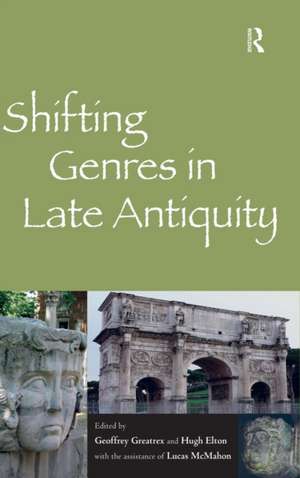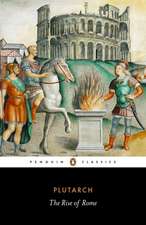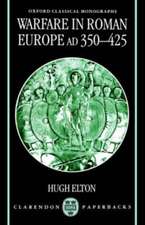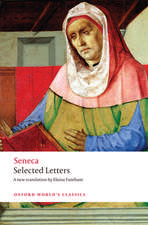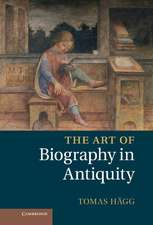Shifting Genres in Late Antiquity
Editat de Geoffrey Greatrex, Hugh Eltonen Limba Engleză Hardback – 13 ian 2015
| Toate formatele și edițiile | Preț | Express |
|---|---|---|
| Paperback (1) | 391.51 lei 43-57 zile | |
| Taylor & Francis – 12 dec 2019 | 391.51 lei 43-57 zile | |
| Hardback (1) | 1012.10 lei 43-57 zile | |
| Taylor & Francis – 13 ian 2015 | 1012.10 lei 43-57 zile |
Preț: 1012.10 lei
Preț vechi: 1234.26 lei
-18% Nou
Puncte Express: 1518
Preț estimativ în valută:
193.69€ • 201.47$ • 159.90£
193.69€ • 201.47$ • 159.90£
Carte tipărită la comandă
Livrare economică 14-28 aprilie
Preluare comenzi: 021 569.72.76
Specificații
ISBN-13: 9781472443489
ISBN-10: 1472443489
Pagini: 358
Ilustrații: Includes 24 b&w illustrations
Dimensiuni: 156 x 234 x 21 mm
Greutate: 0.79 kg
Ediția:Revised
Editura: Taylor & Francis
Colecția Routledge
Locul publicării:Oxford, United Kingdom
ISBN-10: 1472443489
Pagini: 358
Ilustrații: Includes 24 b&w illustrations
Dimensiuni: 156 x 234 x 21 mm
Greutate: 0.79 kg
Ediția:Revised
Editura: Taylor & Francis
Colecția Routledge
Locul publicării:Oxford, United Kingdom
Cuprins
Part 1 Homiletics and Disputation: Medicine in transition: Christian adaptation in the later 4th-century East. Le De obitu Theodosii d'Ambroise (395): une refonte des genres litteraires dans le creuset du sermon politique. Jerome's De viris illustribus and new genres for Christian disputation in late antiquity. The transformation of heresiology in the Panarion of Epiphanius of Cyprus. Part 2 Ecclesiastical Genres: Adapter le genre du breviaire plutot qu'ecrire une histoire ecclesiastique? Enquete sur le choix historiographique de Liberatus de Carthage. The emergence of papal decretals: the evidence of Zosimus of Rome. Collectio Avellana and the unspoken Ostrogoths: historical reconstruction in the 6th century. Elements apologetiques chez Victor de Vita: exemple d'un genre litteraire en transition. Diabolical motivations: the devil in ecclesiastical histories from Eusebius to Evagrius. Part 3 Visual Genres: Producing distinction: aristocratic and imperial representation in the Constantinian Age. Declaring victory, concealing defeat? Continuity and change in imperial coinage of the Roman West, c.383-c.408. The importance of being Stilicho: diptychs as a genre. Part 4 Procopius and Literature in the Sixth-Century Eastern Empire: Power taste and the outsider: Procopius and the Buildings revisited. Belisarius' second occupation of Rome and Pericles' last speech. Technical writing, genre and aesthetic in Procopius. A Justinianic debate across genres on the state of the Roman Republic. Part 5 Technical Genres: The genre and purpose of military manuals in late antiquity. Les contrats de travail dans l'Antiquite tardive: evolution du droit, evolution d'un genre? Natio, gens, provincialis, and civis: geographical terminology and personal identity in late antiquity. Part 6 Other Literary Genres: The rhetoric of Varietas and epistolary encyclopedism in the Variae of Cassiodorus. Byzantine world chronicles: identities of genre. Himerius and the personalization of the monody.
Notă biografică
Geoffrey Greatrex is Professor in the Department of Classics and Religious Studies at the University of Ottawa, Canada, where he has taught for twelve years. He organised the conference from which this book stems and is a specialist in the history of the eastern Roman empire in the fifth and sixth centuries. He is the co-author of The Chronicle of Pseudo-Zachariah Rhetor: Church and War in Late Antiquity (Liverpool, 2011) and a sub-editor for the Encyclopedia of the Roman Army (Oxford, 2014). Hugh Elton is Professor in the Department of Ancient History and Classics at Trent University, Canada, where he has taught for seven years. He was on the programme committee for the conference. He is a specialist in late Roman military history and the archaeology of late Roman Anatolia. He is the author of Warfare in Roman Europe, AD 350-425 (Oxford, 1996) and The Frontiers of the Roman Empire (London, 1996) as well as co-editor of Fifth Century Gaul: A Question of Identity? (Cambridge, 1992) and Regionalism in Hellenistic and Roman Asia Minor (Bordeaux, 2007).
Descriere
This volume examines the transformation that took place in a wide range of genres in Late Antiquity. Aspects of sacred and secular literature are discussed, alongside chapters on technical writing, monody, epigraphy, epistolography and visual representation. What emerges is the flexibility of genres in the period: late antique authors were not slavish followers of their classical predecessors, but were capable of engaging with existing models and adapting them to their own purposes.
